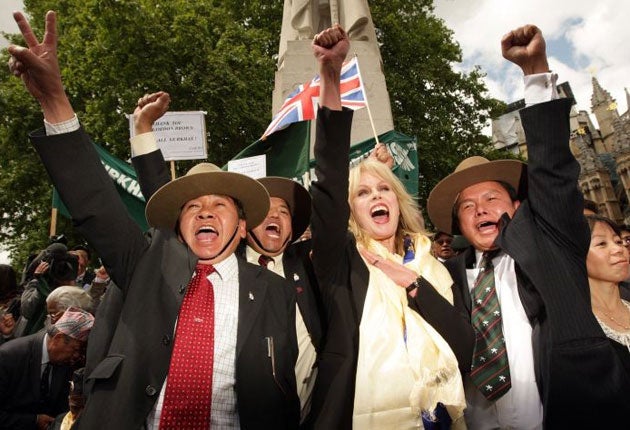Did Lumley's campaign backfire for the Gurkhas?
The actress' high-profile efforts may have caused more problems they solved. By Paul Vallely

She was the embodiment of irresistible force. Joanna Lumley, blonde tresses flowing, moved at the head of a legion of the British army's most doughty and romantic fighters whose war cry is Jai Mahakali, Ayo Gorkhali – "Glory be to the Goddess of War, here come the Gurkhas!"
She swept all before her: civil servants, MPs, ministers, even the then prime minister. She forced the last government into a climbdown so that all the former Gurkha soldiers who had served more than four years in the British Army now have the right to settle in the UK if they wish.
But has it now all gone terribly wrong for the actress whose father served for 30 years with the 6th Gurkha Rifles? The Home Office now estimates that since her famous victory in 2009, more than 7,500 former soldiers and their families have been given visas to settle in the UK. But Britain has not proved the land flowing with milk and honey as they had been led to believe. Instead, according to the British Gurkha Welfare Society, Joanna Lumley's campaign has resulted in thousands of elderly and infirm Gurkhas living in poor accommodation on paltry incomes.
Chhatra Rai, the general secretary of the Gurkha charity, believes it would have been far better if retired Gurkhas had been paid better pensions and encouraged to stay in Nepal. "We told Joanna Lumley that. We are grateful to her for campaigning but entitlement to come to the UK was not the problem. There is also the pension problem. The whole situation is much more complicated than people realise."
Gurkhas remain one of the repositories of British imperial mythology, plucky little natives who had to draw blood once they had drawn their curved kukri blades. The truth has always been more tricky. The Gurkhas were divided in two when India became independent in 1947. Twelve battalions were transferred to the Indian Army while eight battalions were taken into the regular British Army.
The British Gurkhas were based in Malaysia and Hong Kong. But then in 1997 Hong Kong was handed back to China and the Gurkhas moved to Britain. There they served alongside English soldiers whose pensions were three times their own. In 2007, the rules were changed to give Gurkha soldiers who retired after 1997 full pension rights. But there are still about 25,000 Gurkhas who retired before 1997 who still get only about a third of the pension that other British Army regulars receive.
What makes things even more complex is that there are thousands of ex-Gurkhas in Nepal who get no pension whatsoever, because they served less than the minimum 15 years. It is from this group that around 70 per cent of the new arrivals in the UK are drawn. Having no income at all beyond their savings, they rely utterly on the state to survive. Had they been paid even the basic pension, Rai argues, they would probably have stayed in Nepal.
The quality of life for many of these new arrivals is terrible," Rai adds. "They have no money. They are old and frail and have medical problems."
One such individual is Man Bahadur Sunuwar, 67, who with his wife sleeps on a mattress on the floor of his Gurkha cousin Jit Bahadur Sunuwar, 70, in a one-bedroom flat in Aldershot. "Life in the UK is very different from what he was told it would be like in Nepal," says Rai.
Joanna Lumley has issued a statement in response to the plight of the Gurkha arrivals. "We should remember that there would be no Great Britain, no National Health Service and no welfare state were it not for the blood spilt by Gurkhas and others to protect this country in much darker and more dangerous times than those we face now," she says, with her accustomed rhetorical flair.
Her campaign was a success. "It was a wonderful moment in our democratic history, where a public desire for justice turned into a massive campaign that changed government policy in the face of strong resistance from the Ministry of Defence."
She may have forgotten the law of unintended consequences. Political reality is more serpentine than celebrity campaigners sometimes admit.
Join our commenting forum
Join thought-provoking conversations, follow other Independent readers and see their replies
Comments
Bookmark popover
Removed from bookmarks